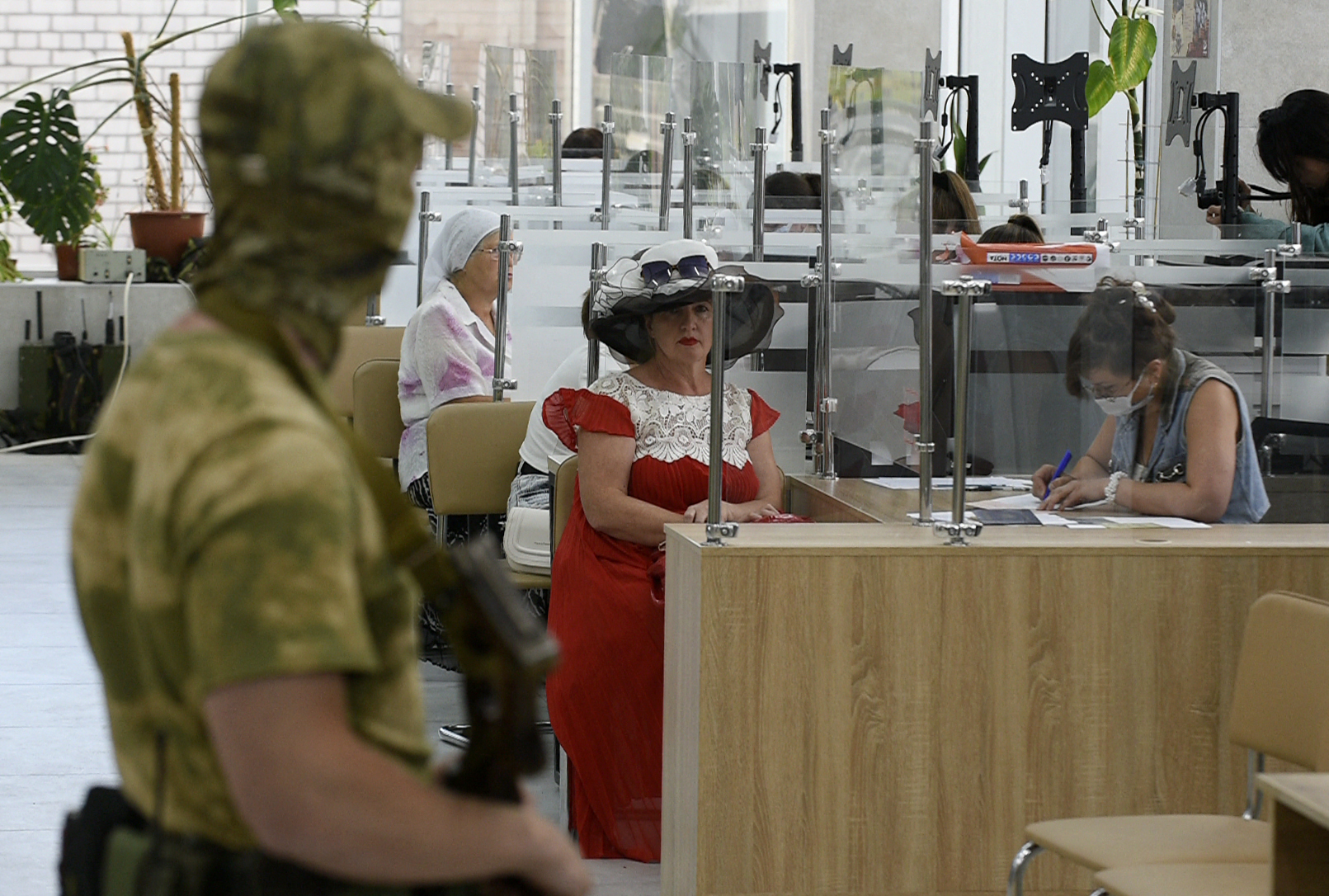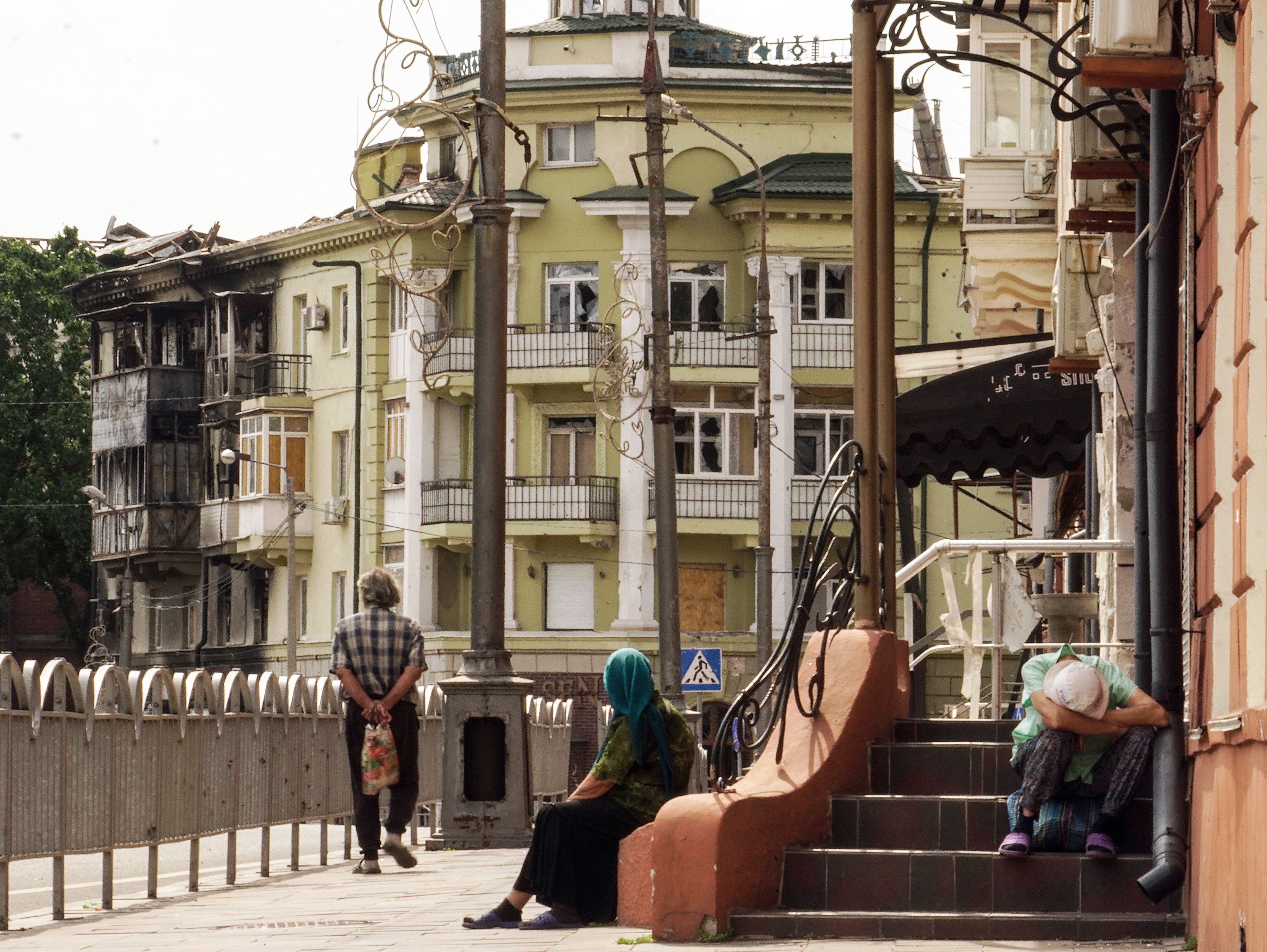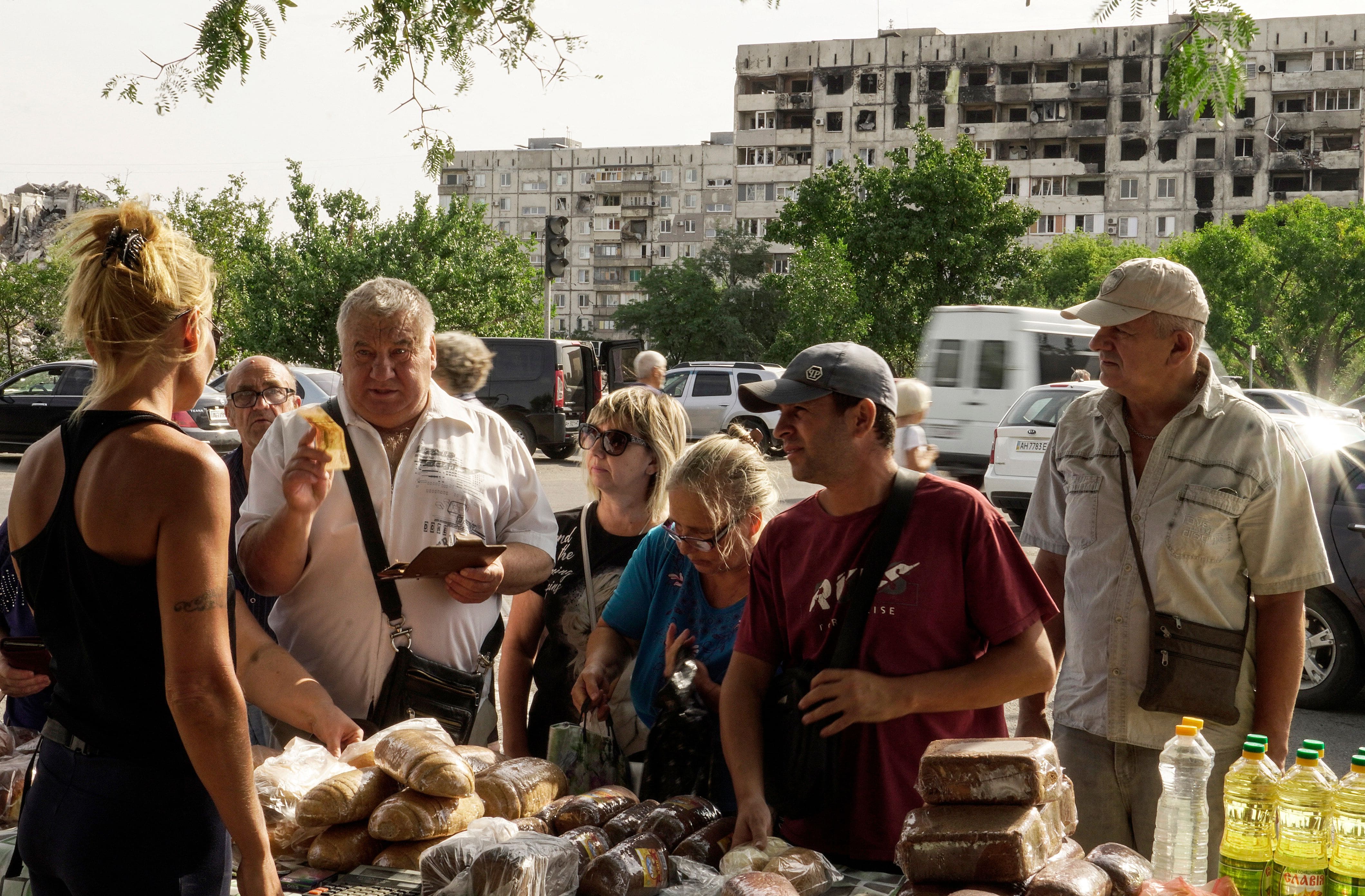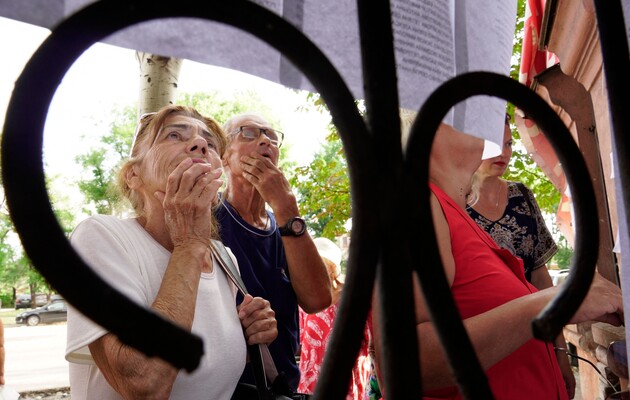Compelled passportization and mobilization, forceful pressure, the seizure of economic resources, the creation of pseudo-institutions, and a large-scale propaganda machine. All this is associated with the Russian occupation of Ukrainian territories. However, in addition to the systematic actions of the russian federation, there is another dimension of occupation — the human dimension.
Citizens of Ukraine in the temporarily occupied territories (TOTs) go their difficult way. It goes hand in hand with heroism, suffering, doubts and, inevitably for a large part of people, the collaboration. This path cannot be measured only by material or physical losses. It also consists of a difficult moral struggle and emotional perception of the situation that each inhabitant of the occupied territories faces personally. The overall picture of life in the TOTs is also affected by how the residents are seen by citizens in the free part of Ukraine.
Is there a standard occupation technology that russia implements in different territories of Ukraine? How to distinguish survival from collaborationism? And how can the state preserve the trust of TOTs residents and prevent a gap between those who stayed in the occupation and those who avoided it?
The Routine of Occupation Technology
If you look carefully at the reactions of residents of different occupied territories of Ukraine, they go through similar stages of embracing the situation. It all begins with a belief in the rapid end of the occupation and a return to former life. Against the background of bloody hostilities and protraction of the outcome, there is a growing willingness to accept any stabilization of the situation (which the occupiers make the skillful use of).
The longer the occupiers stay on Ukrainian lands, the more citizens are forced to interact with them. The inevitable interaction with the occupiers provokes fears among ordinary citizens that they will have to be held accountable, and people in the free territory will not understand the specifics of compelled survival. Russia uses disinformation to actively fuel those fears, persuading citizens of being "tarnished" for Ukraine and therefore lacking alternatives to the current state of affairs.
According to a military psychologist Oleh Pokalchuk, the russian technology of occupation is far from being unique and has already been used by the Nazis.
"To start with, they use terror; then there was the so-called "Night and Fog" operation, when people disappeared without charge or trial. Accordingly, this rests on the algorithms of the dynamics of human behavior which first tries to reduce down to primitive survival and then seek opportunities for socialization if the new socialization seems irreversible. The dynamics of this new socialization takes about 2.5 to 3 years," — Oleh Pokalchuk notes.
Thus, after some time, people adapt and accept the new rules of the game, whether they like them or not. After de-occupation, citizens will assess the dynamics of their lives under occupation from a different perspective but human behavior is standard. "In France, the Resistance Movement was actually very small in the beginning, it included the Spanish, Jews, German communists, and the escapee Soviet soldiers. Jean-Paul Sartre, a classic of philosophy and literature, would securely teaching at a college under the Nazis. And later, after the fact, when it got too hot, everyone rushed to the underground fighters to register, to be part of the Resistance Movement. It even reached the point that people attributed their merits and support to the Resistance Movement for decades," Pokalchuk emphasizes.
Thus, the time under occupation is of critical importance. "For the sake of discussion, if we won back Donbas in 2017, we would have a much better chance of reintegrating the remaining population in social and political terms," the psychologist draws attention to the impact of time on the consequences of the occupation.
In addition to the Nazi experience, russia relies on the Soviet type of propaganda but with absolutely no consideration of reality. This is both their weakness and strength at the same time. russian propaganda often seems ridiculous to us as it is disintegrated from real life in the temporarily occupied territories and looks farcical. But if you use it regularly it turns into an effective poison.
Moreover, there is a third component of russian technology such as reconnaissance, sabotage, awareness building work affecting local population groups or even individuals. According to Oleh Pokalchuk, the general occupation trend of russians currently has many inconsistencies. It can be assumed that they are related to the amorphous nature of objectives of the russian "special operation" itself and the attempt of the russians to adjust them depending on the developments on the combat and diplomatic fronts.
Awareness of the standard dynamics of occupation with all its routines should prevent the temptation to shift responsibility to the inhabitants of the occupied territories. The temptation may strike those who have never been in occupation, who have no family there, and who stay far from such territories. At the same time, russia is always happy to promote and facilitate alienation between citizens in the free and occupied territories.
"This is a Bogardus scale, an index of social distance — if you do not understand something or do not know it, then it seems much further and more disturbing for you, it is a potential source of certain danger. I think that this will be a serious social problem that is now actually emerging. Because people in the rear consciously and subconsciously try to distinguish themselves from the reality and circumstances of war. They clearly try to position themselves as people outside the war. Or rather, they seem to know that it is happening but in this magical way they want to protect themselves mentally. They are ready to sacrifice those who stay in the occupied territories. They are doing it at the cost of their uncompromising stand, ruthlessness and high patriotism, although they do not always manifest it in their actions but they demand it from people under occupation," Oleh Pokalchuk describes problematic aspects of the perception of people from the occupied territories by those staying in the free part of Ukraine.

Ukrainians apply for russian citizenship in Melitopol, Zaporizhia region, on July 14, 2022
Getty Images
It should always be kept in mind that people stay under the occupation which inevitably determines their behaviors. The major problem is the russian occupation itself, rather than how people survive there. Furthermore, we tend to see public manifestations of people's lives on the TOTs from the occupier's news sources. After all, the occupiers have their own perspectives on what to show and what to hide.
A classic all-time example of the occupier's information trap is the demonstration of examples of "greetings" of the russian army by individual residents in the captured territories. Unfortunately, they provoke among some social groups in Ukraine the "who-do-we-fight-for" sentiments.
First of all, such emotional reactions ignore the fact that russia did the clean-up job among the population during the hostilities. As a result, this crucially changed the political and cultural composition. Secondly, the manifestations of the "joy" of civilians can by no means be verified during the bombing and at gun points of Kadyrov fighters.
Another example comes from Crimea. In this case, even some Ukrainian people have subsided into the idea of an "illegal referendum but Crimeans actually wanted it." The two examples of russian manipulative actions have one thing in common: they come from the russians and are implemented when people have been forced by brute force to face the fact of seizure of territory. Therefore, when you are going to comment on the "betrayal" of TOT residents on social media, you need to stop and think twice about a few things. We saw those nasty videos from the captured cities only because the occupiers wanted us to see them. And the persons starring in the russian propaganda videos are not on vacation but under the occupation.
Awareness of the conditions of the occupied territories where Ukrainians have to live does not exempt anyone from responsibility for the intentional help to the occupation and support to the russian army. However, there is a crucial difference between indiscriminately accusing all residents of the occupied territories and prosecuting specific collaborators and criminals. Being able to see this difference is the best response to the manipulative effort in the occupied territories.
Survival Strategies of the People in the Occupied Territories, or How to "come out dry"
People have different reasons to stay in the occupied territories. Some do not have the internal strength or material resources to build a new life in another region. Others cannot leave their sick relatives, or they find it unacceptable to admit the idea of leaving their home. Some people keep hoping for a quick return to normal life. Some people have political illusions about the russian plans, or certain motives to stay — the behaviour strategies in the occupation are also different.
Some citizens try to shut out the reality as much as possible, avoiding any contact with the occupation administrations. This strategy certainly deserves great respect but it brings a huge threat of negative consequences for the citizens. After all, they somehow need to survive, to receive pensions and salaries or educate their children. After the full-scale invasion, russians have been much faster to eliminate any opportunities for citizens to ignore occupation administrations, than it was in the occupied parts of Luhansk and Donetsk regions. For example, in the newly captured territories, direct threats have already been voiced to parents who do not want to send children to the schools of the occupiers. On the other hand, other citizens, regardless of their political views, try to adapt to new reality and find their place there as much as possible.

The residents of the city sit in front of the destroyed houses in Mariupol on August, 27, 2022.
Getty Images
Military psychologist Oleh Pokalchuk believes that residents of the occupied territories have two options to face. The first option is to survive physically. "No one has the right to demand that people sacrifice their lives without guarantees that this sacrifice does not go in vain," Pokalchuk emphasizes. The second option is the moral barrier. “It's one thing for an occupier to tell you to sweep the street, and another thing for an occupier to tell you to participate in some ideological occupation campaigns or in strengthening the occupation power. Here you can always find a possibility to “get away scot-free” or “come out dry,” as they say. I think Ukrainians are masters in this," believes the military psychologist.
The primary task of the government is to explain to its citizens what is allowed or forbidden. Even before the full-scale invasion of russia, the Concept of Transitional Justice was developed on the basis of the Presidential Representative Office of Ukraine in the Autonomous Republic of Crimea. Among other things, it provides for the need to legislate the grounds for amnesty for persons involved in hostilities but who did not commit war crimes. The state also planned to establish the principles of applying lustration to persons acting as public authorities in the temporarily occupied territories. There was also an attempt to provide citizens on the TOTS with the necessary guidelines in the draft law on the principles of state policy about the transition period, which, however, did not find the support among the Ukrainian MPs and reputable international organizations. The new aggression of the russian federation has only exacerbated the need to decide what is "good" and what is "bad", and what will be the responsibility for specific forms of interaction of ordinary citizens with the occupiers. First of all, it is needed for the people themselves as they need to know the principles they have to follow to build their survival strategy.

Residents of Mariupol buy groceries in the improvised market, August, 27, 2022
Getty Images
It would be a great exaggeration to claim that in 2022 the state clearly explains to citizens the boundary between survival and collaboration with the occupiers. These explanations are often made on the go, and depend on the development of events. There are objective reasons for the purported "flexibility" of officials addressing the residents of the TOTs: the dynamic front line and the chances of deoccupation in the near future. However, it is important to try to minimize the uncertainty and leaving unspoken the forms of interaction between citizens and occupying administrations that are unacceptable to the state. The vacuum is always filling up, and russia has already started lying and frightening utility workers with Ukraine's plans to hold them accountable for working at critical infrastructure facilities. The "scary stories" told by russians have absolutely no grounds behind them but we should be incessant in refuting them.
New Societal Divisions
War can unite the society but not only. It can also create new potential dividing lines. “After the "home front society" recovers from those war frights, they will try to boost their self-esteem by re-positioning themselves as "more Ukrainian" and by suppressing, oppressing, and degrading the people who stayed in the occupation,” continues Oleh Pokalchuk. “It may be an ugly situation, and this should be anticipated because such things must be absolutely stopped in advance. We have seen this about the 2014 and in how the internally displaced persons were treated from the occupied territories of Donetsk and Luhansk oblasts. Here, the thing is that one scared people will try to degrade other scared people."
According to the military psychologist, the task of the state may be to declare or specifically showcase that there are no more reasons to be scared, at the end of the day. They need to to reset this situation to factory settings. "And then the simplification of this social communication will highlight some real economic problems and social problems that can be technically settled. Because we are a political nation, we are mystifying a lot, and we are exaggerating the already existing drama. Minimizing this drama, including the fear, is one of the tasks of the state leaders,” says Oleh Pokalchuk.
We can already feel a difference between perception of the current situation in the calm and dangerous regions. Some radiate optimism and believe in quick victory, while others do not see any prospects for the future. The reasons for the differences in visions are clear but it is important that they do not develop into new and long dividing lines.
In the war, unfortunately or fortunately, the state bears the main responsibility for preserving the integrity of society. Unfortunately, we haven't talked much about it since the outbreak of war in 2014.
Original article: Дзеркало тижня
